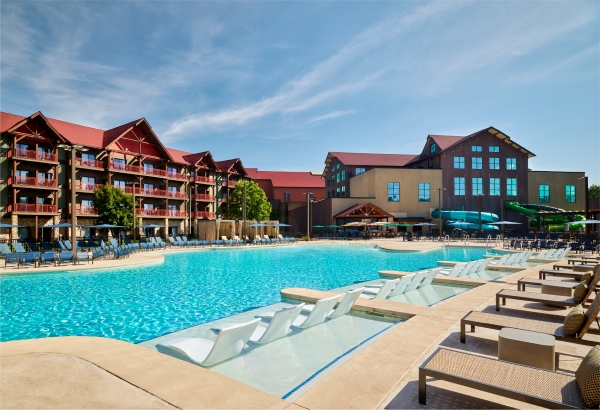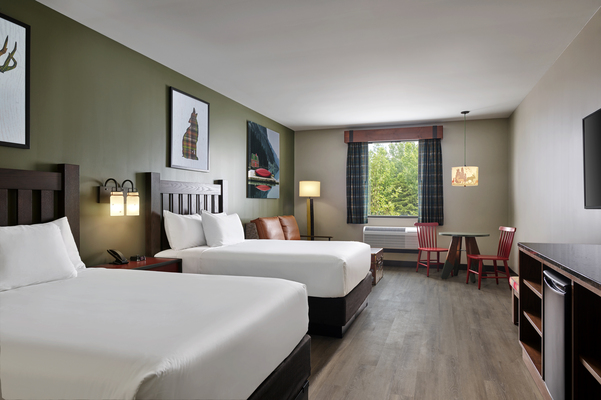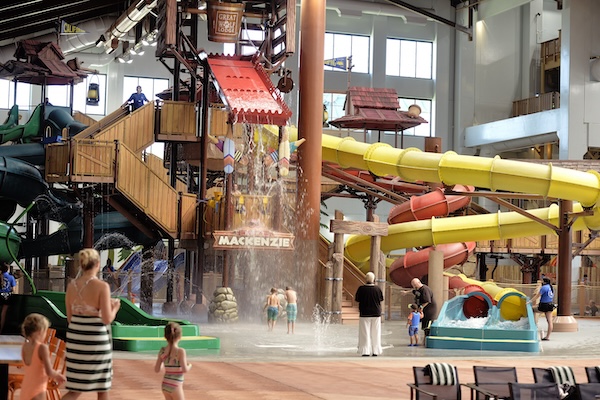Imagining Stephen Schwarzman, the billionaire CEO of Blackstone, barreling down a water slide at a Great Wolf Lodge indoor theme park might be difficult to conjure, but to hear it from John Murphy, the CEO of Great Wolf Resorts, it’s a plunge he is happy to take.
In 2019, Blackstone, the alternative asset manager titan with more than $1 trillion in assets under management, acquired a 65% controlling interest in Great Wolf, which at the time had 18 resorts that look like the progeny of a Chuck E. Cheese and a Six Flags, with a side of traditional lodging. Think water elements, from slides to pools, rope courses, mini-golf, bowling, arcades and more.
Disney World light? Maybe. Family fun for all? Certainly. And with five years of Blackstone backing, 20 operating resorts with three in the pipeline, it’s an appealing that delivers both cash flow and as a real estate play. “They absolutely love this business,” said Murphy, who became CEO of Great Wolf in 2022, replacing Murray Hennessy. Blackstone, according to Murphy, has helped fuel more than $2 billion worth of investment since 2019.
The business model, Murphy contended, is what drew Blackstone in. “If we achieve a $300 average daily rate, we’ll get another $300 of on-site spend, so there are a lot of levers for us to pull.”

Murphy, known as Murph, comes from a hotel management background, having founded Evolution Hospitality in 2011, a company that was eventually sold to Aimbridge in 2021. That year, he and his business partner started Triton Hospitality, which was focused on acquiring over-leveraged and under-performing assets. A year later, Blackstone called about a position where his employees would be referred to as pack members, kid guests known as pups and take-home souvenirs paw prints.
To hear it from Murphy, the success of Great Wolf lies in its simplistic, authentic approach to travel and hospitality. “Our mission is to bring joy to families,” he said, which means having an engaged team of pack members at each property to ensure that happiness. It goes well beyond the physical product, even though the Howlin Tornado, a six-story “funnel of fun” raft experience would make even the most stony-faced among us screech with glee.
Part of delivering family magic is through the longevity of some of Great Wolf’s staff. Murphy was recently at Great Wolf’s Colorado Springs, Co., property, where the general manager there has been with the company for 25 years, having started as a lifeguard, of course, one of the most important positions at Great Wolf. “He’s worked at six of our lodges, he’s had seven promotions and now he’s one of the top GMs in our portfolio,” Murphy said. “There’s an awful lot of pride there.”
In 2023, the company opened its largest lodge yet in Perryville, Md., about two hours northeast of Washington, D.C., and an hour from Baltimore. It’s large: 700 suites and a more than 128,000-square-foot water park. This year, the brand is set to open two additional lodges in Naples, Fla., and Webster, Texas, both of which will unveil a new design and theme, which promise to be more immersive and include interactive storytelling elements to enhance the overall experience.
Midway through next year, a $300-million, 549-room Great Wolf Lodge is slated to open in Connecticut next to Foxwoods.
“We have our hands full right now. These are big projects,” Murphy said. “We need to get these open and ramped up—that’s really our focus right now.”
Great Wolf has the advantage of economies of scale when it comes to resort operations. And though 20 properties across the U.S. and Canada may seem like a rather small “paw print,” the fact is that its geographical spread is conducive to serving the whole country fairly well. The concentration of resorts is east of the Mississippi River, but with the addition of the three new lodges, it’s estimated that a Great Wolf Lodge is reachable within a four- to five-hour drive, key for families on stricter travel budgets.

At a Great Wolf property, room bookings include passes to the water park. Everything else is à la carte, but Murphy, in a nod to true all-inclusiveness, has looked at bundling things further, toward what he called an “all-inclusive family destination.” Great Wolf currently offers three distinct packages at tiered rates: Wolf Pass, Paw Pass and Pup Pass. These passes include things like games, candy and off-site activities. There is also the Ultimate Food & Fun pass, which includes dining credits for resort restaurants. Great Wolf also offers day passes that allow families to enjoy the water park without staying overnight.
“While we know people do venture out to the local community, they have everything they need within our four walls,” Murphy said. “We offer the gamut and that allows people to spend time on what’s most important and that’s connecting with their family. It’s really different than any other hospitality product.”
Great Wolf’s rather non-traditional product is equaled by the company’s approach to business. Unlike others, Great Wolf manages and owns all its assets, save for its Niagara Falls property, which is franchised. “We’re in control of our own destiny,” Murphy said, command that allows the company to pivot quickly as needed and bring new and exciting ideas to market with alacrity. “We can do it in in ways that are much quicker than the traditional format.”
Great Wolf is primarily focused on what cohort: families with children, the more the merrier. Murphy said that 90% of its business is direct and it does around 5% group, mostly catering to SMERF, or groups that fall under the categories of Social, Military, Education, Religious and Fraternal. Annual occupancy levels, which spike on school breaks, are around 80%.
They could reach higher. In April, Hilton Grand Vacations announced a partnership with Great Wolf that allows HGV members the ability to exchange club points for stays at Great Wolf properties. In addition, Great Wolf Lodge guests will receive curated offers to explore HGV’s network of properties.
Of the alliance, Murphy noted a similarity in cultures around the idea of connection to families. “This is a real win-win for both partners,” he said. “It increases the family experiences available and provides them with an opportunity to gain exposure to our guests and share the benefits of vacation ownership.”

Proof of Product
The evidence of the strength of Great Wolf Resorts’ business, particularly through COVID, was made clear earlier this year through $2.55 billion worth of CMBS portfolio refinancing, supported by a pop in leisure travel, especially to drive-to destinations. “Being able to pull together as a family unit and vacation is always important,” Murphy said. “The markets responded to that. We’ve had exceptional growth and all of this came together on this recent refinancing.”
In July, Great Wolf Lodge Grand Mound, in Washington, a midpoint between Seattle and Portland, celebrated the completion of a $40-million renovation project that included updates to the guest suites, water park, attractions, restaurants, conference center and more.
Late last year, Great Wolf Lodge Pocono Mountains unveiled a $125-million resort-wide transformation that included the addition of 202 new suites, 30 new three-bedroom villas, seven new water slides, two new restaurants, a new outdoor pool and entertainment space and a completely renovated lobby. These accretive moves are characteristic of something Murphy promised more of, what he referred to as “densification projects,” with a specific focus of the addition of more villas to accommodate families at a higher price point.
Great Wolf properties, expectedly, require frequent and often intense care. Once a year, each one of the water parks shut down for weeks for proper maintenance and safety checks. “An important part of our proposition is keeping families safe,” he said.






